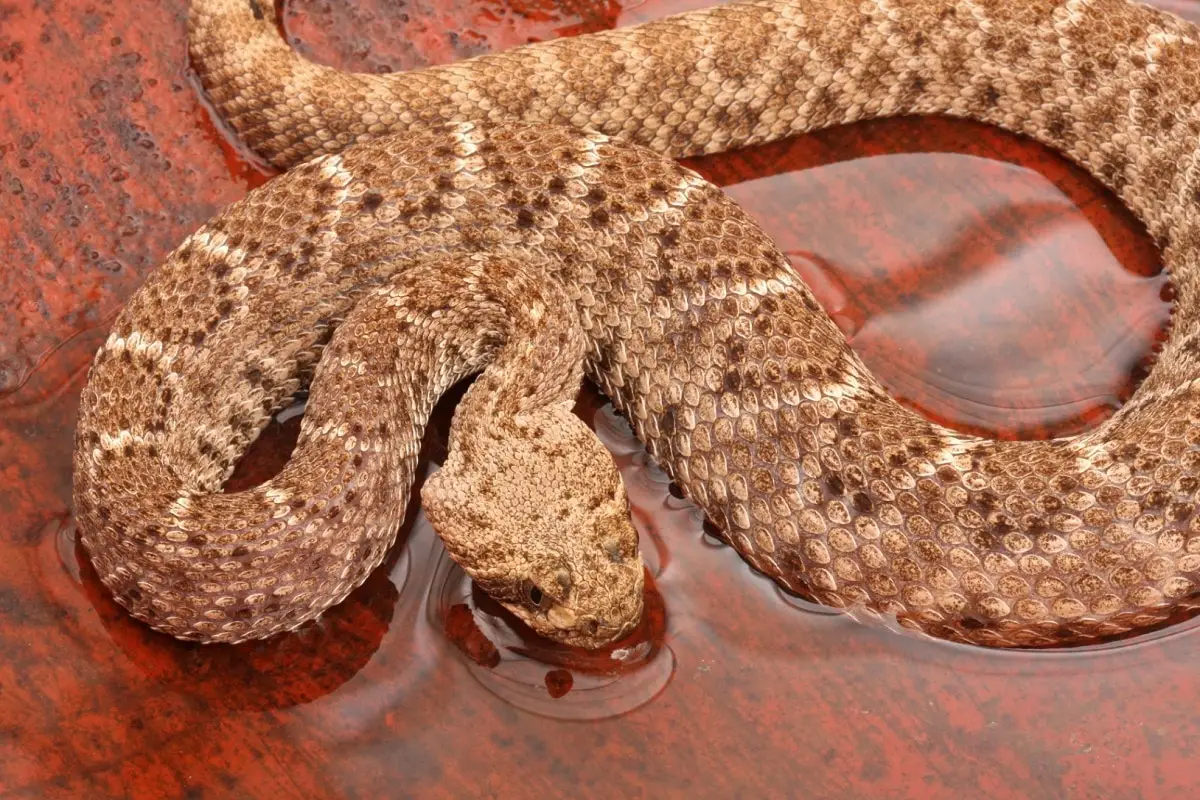People sometimes run into rattlesnakes while hiking, fishing, gardening, or just walking through a park. But what if you are in or near a body of water, will there be rattlesnakes nearby? Do rattlesnakes like water? Read more to find out.
Do Rattlesnakes Live Near Water?
Rattlesnakes live in dens and venture out locally (within a few miles) for eating, drinking, and finding mates.
Many people think rattlesnakes do not need to drink water, but this is not true. Like other animals, rattlesnakes need to drink water. So, they will need to live close enough to a water source to drink when they need to. This includes lakes, streams, springs, creeks, even drainage from human-made structures such as houses and barns.
So, if you have an open water source on your property, a rattlesnake could be living nearby!
What Attracts Rattlesnakes to Water?
As mentioned, rattlesnakes drink water, and will also sometimes use it to cool off when it is very hot.
They are also attracted to water because of the rodents and insects nearby that also need water.

How Do Rattlesnakes Drink Water?
Snakes get some water from their food, especially water prey such as fish and frogs, but they need to drink water to get the rest.
Snakes have split fork tongues that make drinking water different from other animals, or humans for that matter. When they go to drink, they make their mouths air-tight and suck the water like a straw to get it into their mouths. The bottom part of a rattlesnake’s mouth captures water with small grooves that help them slurp the water down. Their jaw muscles help to force the water down, just as they do with their food.
What Animals Do Rattlesnakes Hunt Near Water?
Animals rattlesnakes hunt near water include:
- Mice
- Small rabbits
- Squirrels
- Birds and eggs
- Frogs and small lizards
- Large insects
Baby rattlesnakes will feed off of mostly very small prey, such as mice and insects. Larger rattlers will attack anything they think they can kill and fit into their mouths, which includes full-grown squirrels and rabbits.
Adult rattlesnakes are attracted to areas that have a lot of small wildlife. This includes forests, prairies, gardens, farmland (organic), parks, and even beaches. They also like to have places to hide, so fallen lumber tall grasses, and rocky outcroppings are favorites for them.
In warmer months, rattlesnakes are most active outside of their dens, and this is also the time when rodents and large insects are active as well.
What Types of Water Do Rattlesnakes Like?
Rattlesnakes, like other animals, prefer to drink flowing water or from new puddles. They do not want to drink from water that is stagnant. If it is stagnant and they drink it, they can ingest too much bacteria from feces that will make them sick. If they live near a river or lake, this will allow them to drink water that is fresh and devoid of too many contaminants.
Can a Rattlesnake Swim?
Believe it or not, rattlesnakes can swim well. They will eat, hide from predators, or mate in the water if the opportunity presents itself.
How do rattlesnakes swim?
Even though rattlesnakes do not have arms, legs, or fins, they have the ability to slither through the water easily. They glide over the surface or with their bodies slightly submerged with their heads above the water.
There is surface tension on the water that helps rattlesnakes stay on the surface and surf across it. The muscles that line its entire body beneath its scales move together in an “S” motion to propel the snake across the surface.
Mostly, a rattlesnake will cross a body of water to get to dry land on the other side and not just hang out in the water. If you are going to swim in a river or lake, be aware that rattlesnakes may be in the water, even though this is a rare activity for them.
Rattlesnakes will also likely not be as aggressive in the water as they would on land, so you can be less afraid when you go swimming! However, if you see a rattlesnake or any snake for that matter in the water, do not bother it. The snake will likely just leave you alone to get to where it is going.
Can a Rattlesnake Bite You When It’s In the Water?
Rattlesnakes can definitely bite you when they are in the water. This usually only happens if you bother them while they are trying to get to the other side. If they feel threatened, even in the water, they will bite.
Rattlesnakes like to hang out on the water’s edge and sun on logs or tree limbs. If you spot one on the water’s surface, just leave them alone.
How to Avoid Getting Bitten By a Rattlesnake Near Water
If on land and near water, keep an eye out for rattlesnakes relaxing or sunning themselves on objects such as fallen trees or large rocks. Rattlesnakes will usually be resting or looking for prey.
If you spot a rattlesnake in the water, do not go near it and definitely do not bother it. It likely is just trying to get somewhere or avoid a predator and does not want any distractions.
Rattlesnakes need water just like other animals, so they will not live too far away from access to it. If you are traveling through an area with a body of water, just keep in mind that rattlesnakes could be nearby.
Useful Snake Repellents
Ortho Snake B Gon1 – Snake Repellent Granules, No-Stink Formula
Harris Snake Repellent Spray for Indoor and Outdoor Use
Bonide Snake Stopper Snake Repellent, 4 lb Ready-to-Use Granules for Outdoor Pest Control
